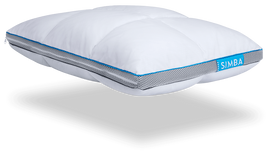The stages of sleep
Even if you’re not much of a dancer, you’ve definitely got rhythm(s).
Our days and our bodies run on all sorts of cycles, such as the circadian rhythm - a roughly 24-hour body clock that tells us when we should sleep and wake. And there are a number of ‘ultradian rhythms’ too, which run through the course of one day, such as peaks and troughs in energy and focus. So it shouldn’t come as a surprise that sleep itself follows a pattern of stages and cycles - the kind you see mapped out in sleep tracking apps. And they do matter when it comes to sleep quality.
Sleep stages vs. sleep cycles
The two terms are often used interchangeably, but there’s actually a big difference between sleep cycles and sleep stages.
Over the course of the night, you should go through five cycles of sleep (although some people go through four or six), each of which takes around 90 minutes to complete. Each cycle contains four different stages.
Each sleep cycle includes the same stages of sleep, and they’re all equally important - but they’re not actually identical to each other.
So, in a nutshell, you’ll go through the four stages of sleep 4-6 times every night.
Stages of sleep
Within each sleep cycle, there are four stages of sleep. Three of them are called non-REM sleep, and the fourth is, well, REM sleep. You might be familiar with the phrase REM; it stands for Rapid Eye Movement, and it’s the stage where we dream.
Non-REM sleep is sometimes referred to as ‘deep’ sleep. It’s actually a three-stage process that gets deeper as it progresses.
It’s perfectly normal to briefly wake up between cycles - in fact, most adults do. You may not even remember this in the morning, as it happens very briefly and it’s generally easy to drop off again.
So, what is your sleep cycle?
Stage 1: Light non-REM
This is the lightest stage of non-REM sleep, or the bit where you’re ‘drifting off’. Occasionally, you might be aware of yourself suddenly jerking your arms or legs, or feel a falling sensation, and this could wake you up - but usually it’s easy enough to go back to sleep. (Ever had those moments where you feel yourself ‘trip over’ something and wake up? Don’t worry, it’s very common!)
This stage is the beginning of the transition into sleep. You’ll experience the following without noticing it:
- Muscles begin to relax
- Heart rate slows
- Breathing also slows
- Eyes move slowly behind eyelids.
In this stage, your brain produced ‘alpha and theta waves’. It only lasts for around seven minutes, and this is the stage you’ll go through if you have a ‘power nap’.
Stage 2: Initial non-REM sleep
You’re still fairly lightly asleep during stage two, but things begin to slow down:
- Eye movements stop
- Your body temperature and heart rate drop further
Your brain, on the other hand, is going wild. It will experience a series of ‘sleep spindles’ - that is, spikes of activity in brain wave frequency - before slowing down again.
Stage 3: Deep non-REM sleep
This is the hardest sleep stage to wake up in, as you’re far less reactive to external stimuli (like that car alarm that keeps going off). Your brain waves are slow ‘delta’ waves, but can still move your muscles, so if you’re a wriggler, this is when it’s most likely happening.
This is when the body:
- Makes repairs to muscles and other tissues
- Focuses on growth
- Recovers immune function
- ‘Gets ready’ for the next day.
Next you’ll move into an even deeper, more restorative stage of sleep - the famous one known as ‘REM sleep’.
Stage 4: REM sleep
Stage, rapid eye movement (REM) sleep, is the one we all think of when we talk about sleep. It’s called that because of the quick movements of your eyes under your eyelids, and it’s the stage where you dream.
Because your mind is busy - and your brain waves behave almost as if you’re awake - the muscles that move your body are held still. This is for your own safety, as you don’t want to act out your dreams without full control over your body - no matter how amazing they are! If you wake up during REM sleep, you’re also more likely to remember your dreams.
As well as dreaming, you’ll experience:
- Increased heart rate and blood pressure
- Faster breathing
REM is a hugely important part of sleep, as most experts agree it's the part where your brain ‘sorts out’ the events of the day. These events are processed (which might be the cause of dreaming) and put into your long term memory.
Progressive sleep cycles
In the early part of the night, your sleep cycles will favor more non-REM sleep. Closer to waking, you’ll get more REM sleep. That’s why it’s not enough to just get two or three cycles at a time - you need to go through multiple cycles in order to experience all the stages fully. These are called ‘progressive sleep cycles’.
Many experts think that the changing nature of our sleep cycles cycles means there are some different processes happening; for example, in our podcast episode on creativity with Sir John Hegarty, we discussed a theory from scientists at Cardiff University that suggests the different sleep stages work together to develop problem solving. Each type is also associated with different forms of memory; non-REM sleep is thought to help us remember facts and information, whereas REM sleep is associated with remembering how to do something like riding a bike.
Keeping your sleep cycles healthy
It goes without saying that getting proper sleep is good for us in more ways than one, helping us with everything from better memory retention to keeping us in a good mood. That’s because we need to experience multiple sleep cycles, and all the stages within them, every night - and disturbed sleep means the pattern is disrupted and we may miss out on stages.
To ensure you experience all the stages of sleep you need within your sleep cycles, keep an eye on the following:
- Make sure your sleeping environment is calm, quiet, and free from stimuli that might unexpectedly wake you up (we’re looking at you, pets!)
- Give yourself enough time to sleep a full eight hours so you have a better chance of completing all the cycles you need.
- Make time to rest and relax before you go to bed, so you drop off in good time and have an undisturbed night.
- Avoid caffeine, alcohol, and other stimulants that might keep you awake or disturb you during the night.







